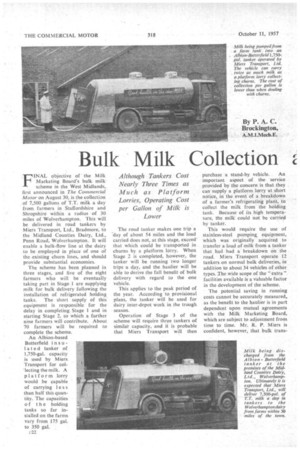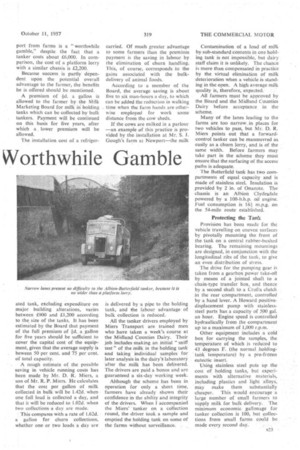Bulk Milk Collection Worthwhile Gamble
Page 56

Page 57

If you've noticed an error in this article please click here to report it so we can fix it.
FINAL objective of the Milk Marketing Board's bulk milk scheme in the West Midlands, first announced in The Commercial Motor on August 30, is the collection . of 7,500 gallons of T.T. milk a day from farmers in Staffordshire and Shropshire within a radius of 30 miles of Wolverhampton. This will be delivered in road tankers by Miers Transport, Ltd., Bradmore, to the Midland Counties Dairy, Ltd., Penn Road, Wolverhampton. It will enable a bulk-flow line at the dairy to be employed in place of one of the. existing churn lines, and should provide substantial economies.
The scheme has been planned in three stages, and five of the eight farmers who will be eventually taking part in Stage I are supplying milk for bulk delivery following the installation of refrigerated holding tanks. The short supply of this equipment is responsible for the delay in completing Stage 1 and in starting Stage 2, to which a further nine farmers will contribute. About 70 farmers will be required to complete the scheme.
An Albion-based Butterfield insulated tanker of 1,750-gal. capacity is used by Mien Transport for collecting the milk. A platform lorry would be capable of carrying 1.e s s than half this quantity. The capacities of the holding tanks so far installed on the farms vary from 175 gal. to 350 gal.
1-22
The road tanker makes one trip a -day of about 54 miles and the load carried does not, at this stage, exceed' that which could be transported in churns by a platform lorry. When Stage 2 is completed, however, the tanker will be running two longer trips a dpy, and the haulier will be able to derive the full benefit of bulk delivery with regard to the one vehicle.
This applies to the peak period of the year. According to provisional plans, the tanker will be used for dairy inter-depot work in the trough season.
Operation of Stage 3 of the scheme will require three tankers of similar capacity, and it is probable that Miers Transport will then
purchase a stand-by vehicle. An
important aspect of the service provided by the concern is that they can supply a platform lorry at short notice, in the event of a breakdown of a farmer's refrigerating plant, to collect the milk from the holding tank. Because of its high temperature, the milk could not be carried by tanker.
This would require the use of stainless-steel pumping equipment, which was originally acquired to transfer a load of milk from a tanker that had had a breakdown on the road. Miers Transport operate 12 tankers on normal bulk deliveries, in addition to about 34 vehicles of other types. The wide scope of the " extra " facilities available is a valuable factor in the development of the scheme.
The potential saving in running costs cannot be accurately measured, as the benefit to the haulier is in part dependent upon mutual agreements with the Milk Marketing Board, which are subject to adjustment from time to time. Mr. R. P. Miers is confident, however, that bulk trans
ated tank, excluding expenditure on major building alterations, varies between £900 and £1,200 according to the size of the tanks. It has been estimated by the Board that payment of the full premium of id. a gallon for five years should be sufficient to cover the capital cost of the equipment, given that the average supply is beween 50 per cent. and 75 per cent, of total capacity.
A rough estimate of the possible saving in vehicle running costs has been made by Mr. D. R. Miers, son of Mr. RP. Mie_rs. He calculates that the cost per gallon of milk collected in bulk will be I.42d. when one full load is collected a day, and that it will be reduced to 1.02d. when two collections a day are made.
This compares with a rate of 1.62d. a gallon for churn collections, whether one or two loads a day are is delivered by a pipe to the holding tank, and the labour advantage of bulk collection is reduced.
All the tanker drivers employed by Miers Transport are trained men who have taken a week's course at the Midland Counties Dairy. Their job includes making an initial "sniff test" of the milk in the holding tank and taking individual samples for later analysis in the dairy's laboratory after the milk has been delivered. The drivers are paid a bonus and arc guaranteed a six-day working week.
Although the scheme has been in operation for only a short time, farmers have already shown their confidence in the ability and integrity of the drivers When I accompanied the Miers— tanker on a collection round, the driver took a sample and emptied the holding tank on some of
the farms without surveillance. .




















































































































